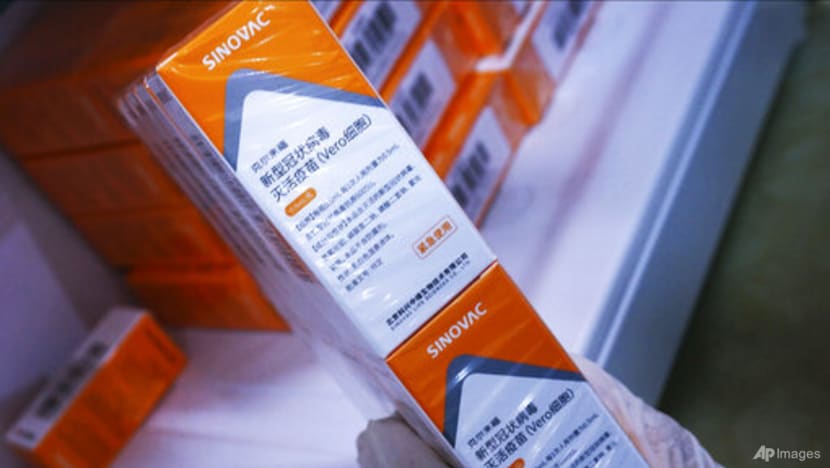90 suspected adverse events reported after Sinovac COVID-19 vaccinations in Singapore: HSA

File photo of a nurse handling a package of refrigerated COVID-19 vaccine doses from Chinese company Sinovac, in Hangzhou in east China's Zhejiang province. (File photo: Chinatopix via AP)
SINGAPORE: Ninety suspected adverse events after Sinovac-CoronaVac vaccinations were reported as of Aug 31, said the Health Sciences Authority (HSA) on Thursday (Sep 16).
Among the 90 reports were five "serious reports", said the HSA in a safety update on COVID-19 vaccinations.
These included one report each of Bell’s Palsy, serious allergic reaction and vertigo with ringing of the ears, as well as two reports of anaphylaxis.
Bell’s Palsy is caused by inflammation of the facial nerve and is a condition that causes temporary weakness or paralysis of the facial muscles, while anaphylaxis is a rare and potentially life-threatening allergic reaction that can occur after vaccination.
As of Aug 31, more than 168,400 doses of the Sinovac vaccine have been administered in Singapore.
An adverse event is classified as serious when the event resulted in hospitalisation or extended stay in hospital, resulted in a significant reduction in functioning level or a disability, resulted in a life-threatening illness or death, resulted in birth defects or is a medically important event, said HSA.
Overall, the suspected adverse events to the Sinovac vaccine "were consistent with those typically observed following vaccination", said HSA, adding that it will continue to monitor the events.
The Sinovac vaccine was made available at designated clinics from Jun 18, after it was placed on HSA’s special access route on Jun 2.
ADVERSE EFFECTS TO PFIZER, MODERNA VACCINES
In the update, HSA also said that as of Aug 31, it has received 11,737 suspected adverse effect reports associated with the use of Pfizer-BioNTech and Moderna COVID-19 vaccines.
These reports make up 0.13 per cent of the more than 8.7 million doses administered as of Aug 31.
The most commonly reported adverse effects were “consistent with those typically observed following vaccination” and were "generally resolved within a few days", said HSA.
They include dizziness, shortness of breath, chest tightness, palpitations, injection site reactions such as pain and swelling, fever and allergic reactions such as rash, itch, hives and swelling of eyelids, face and lips.
Among the reports were 498 cases that were classified as serious adverse events, said HSA in the update. This made up 0.006 per cent of doses administered.
Of the cases, 72 were reports of anaphylaxis and 49 were reports of other severe allergic reactions.
All the patients who reported anaphylaxis were reported to have recovered after medical treatment, said HSA.
"The incidence rate of anaphylaxis reported locally with the vaccines is about 0.87 per 100,000 doses administered, which is similar to the incidence rates reported overseas," it said.
Other serious adverse events include exacerbation of underlying asthma condition, breathing difficulty,
fast heart rate, an increase or decrease in blood pressure, chest discomfort and pain,
pericarditis or myocarditis.
Serious adverse events are being closely monitored by HSA.
HSA said that background disease incidence or underlying medical conditions are taken into consideration when determining if the vaccine had any contributory role to these events.
"Most of the individuals who developed serious adverse events were reported to have recovered or are recovering," said HSA.
ADVERSE EVENTS OF 'SPECIAL INTEREST'
In the update, HSA also listed several adverse events of special interest, which include anaphylaxis, Bell’s Palsy, myocarditis and pericarditis.
An adverse event of special interest is "a medically significant event that has been observed historically with other vaccines", said HSA.
"HSA is closely monitoring the occurrence of such adverse events to detect any increase over baseline incidences," it said.
Cerebral venous thrombosis (CVT) was among the adverse events of special interest noted by HSA.
There have been "rare cases" of CVT reported with the Pfizer-BioNTech and Moderna COVID-19 vaccines, both overseas and locally.
CVT is a very rare type of blood clot occurring in the veins of the brain, which can happen naturally regardless of whether people have been vaccinated, said the authority.
HSA has received 10 suspected reports of CVT with the Pfizer-BioNTech and Moderna COVID-19 vaccines. None of the cases had a fatal outcome, it said.
"The number of cases of CVT reported is small and with observed fluctuations in the yearly background incidence rates locally, it cannot be determined if there is an increased incidence of CVT associated with the use of the mRNA vaccines," said HSA, adding that it is monitoring this event closely and reviewing the cases with its expert panels.
"So far, no overseas regulators have identified CVT as a safety signal with mRNA vaccines."
HSA said it was important to note that the CVT cases reported locally are not associated with thrombocytopenia, which is low platelet levels, and are "different in clinical presentation" from the overseas cases of CVT with thrombocytopenia that have been reported with the AstraZeneca and Johnson & Johnson COVID-19 vaccines.
HSA added that some of the possible risk factors of CVT include a medical history of blood clotting disorder, head trauma and the use of medicines such as oral contraceptives and hormonal replacement therapies.
Patients with CVT are generally treated with anticoagulants – blood-thinning medicines – for a few months.
The yearly background incidence of CVT in the general population is 1.3 to 2 per 100,000 persons, said HSA.
"CVT has also been reported to be associated with COVID-19 infection at an incidence of 8.4 per 100,000 infections in a local study," it added.
In its update, HSA said that "most" of the 96 reported adverse events of Bell's Palsy were "non-serious".
"The local incidence rate is estimated to be 2.4 per 100,000 persons per month, which is within the background incidence of 1.1 to 4.4 per 100,000 persons per month prior to the introduction of vaccination."
It added that Bell's Palsy was reported in the clinical trials of the Pfizer-BioNTech and Moderna COVID-19 vaccines, but the numbers were assessed to be within background incidences.
"Most of the patients will generally have complete recovery even without treatment," it said.
FAINTING AFTER JAB NOT UNCOMMON IN CHILDREN: HSA
Since the roll-out of the vaccination programme in students aged 12 and above, HSA has received 491 reports of adverse events – about 0.08 per cent of doses administered.
COVID-19 vaccinations for students aged 12 and above began on Jun 3 in Singapore.
The commonly reported adverse effects include rash, hives, swelling of the eyelids, face and lips, shortness of breath, chest tightness, fever, dizziness, light headedness, as well as syncope, which is fainting and temporary loss of consciousness.
These reported adverse events generally resolved within a few days, said HSA.
"Syncope occurring after vaccination is not uncommon in adolescents and has been reported with the Pfizer-BioNTech COVID-19 vaccine both overseas and locally," said the authority.
"It is generally triggered by the vaccination process, such as anxiety about the injection and fear of pain, and not by the vaccines.
"Patients will generally recover quickly if they lie down, and symptoms typically resolve after five minutes."
Locally, 26 reports of syncope among children aged 12 to 18 years old have been reported to HSA.
The local rate of syncope in this age group is about 4.5 per 100,000 doses – similar to the rate from overseas reports, said HSA.
"Safeguards have been implemented to mitigate this risk, which include vaccinating those who are anxious or with needle phobia while lying down, and vaccine recipients are also advised to drink, eat and rest well before coming for their vaccination," said HSA.
BOOKMARK THIS: Our comprehensive coverage of the COVID-19 pandemic and its developments
Download our app or subscribe to our Telegram channel for the latest updates on the coronavirus pandemic: https://cna.asia/telegram
















